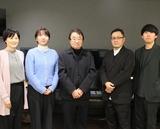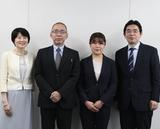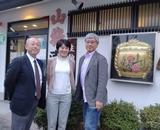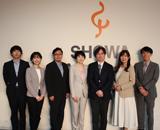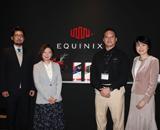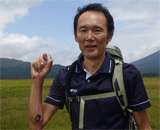February 2019
Many Highly Professional Staff Members
Baba: Kimberley was in charge of establishing the framework for the translation. What did you think of her work?
Otsuka: She was extremely helpful. Very, very professional, not only in terms of her English, but her knowledge of Japanese as well--she knew Japanese words we didn't even know, for instance (laughs). In that sense, we really felt like she understood precisely what we wanted to convey in the text.
Baba: I do think her understanding of language is just different from ours. It's the same with Itoh. He's proficient in English, Chinese, and Korean, and is currently deep into studying the ASEAN languages, for which there's been more demand recently.
Itoh: Vietnamese was originally a language expressed in Chinese characters, but this was abolished under French colonial rule, and their written language came to be expressed in an alphabet known as "Chữ Quốc Ngữ (national script)." Though it's referred to as an alphabet, it has a lot of auxiliary symbols that Japanese people aren't used to seeing, and since it derives from Chinese characters, the words themselves tend to be short. Like Japanese, they have their own language system--the equivalent of the native Japanese language in Japan--as well as a Chinese-derived language system, so in that sense Vietnamese is a language that feels very familiar to me. Speaking of which, how was the Vietnamese translation for this project?
Otsuka: It was very solid--thank you. The local staff were especially happy about the guideline that you created for future content. Both we and the staff in Vietnam wanted to be consistent with regards to the language we used to express Suntory. The long-term approach that Arc took with this project and the ideas you had will no doubt contribute to the development of our other projects as well.
Aikawa: It's our impression that Arc has a lot of highly professional people, including of course Kimberley and Mr. Itoh. This was a source of comfort for us during the whole project.
Country-Specific Websites as a Springboard for International Communication
Ohsato: What was your greatest struggle in developing this Vietnam-oriented website?
Aikawa: When we were trying to launch the project, it was difficult to explain why we needed a whole separate website specific to Vietnam. The other difficulty was in figuring out whether the design Suntory had created was suited to the national character of Vietnam. And finally, it was a bit anxiety-inducing for us, as the representatives in Japan, because we weren't able to understand Vietnamese and figure out whether the finished product was what we really wanted it to be. I think these three were the main things.
Otsuka: Also, figuring out what kind of content we wanted to post was quite a struggle too. We were going to bring in content from the global website, but we had to decide what we wanted to bring in and what we wanted to get rid of--something we'd never done before. I think the process of deciding what content to post while trying to get a consensus internally was pretty challenging on its own.
Ohsato: What do you think drove the company to approve this project?
Otsuka: Everybody understood the need for Suntory to expand into various other languages.
Aikawa: I think they were in support of the idea of using this project as a gateway for internal communication with the countries the company is involved with. Working on these websites with local companies will allow Suntory to create connections amongst employees in Public Relations, as well as each country's Corporate Brand Strategy Department counterparts. We actually decided to set up each project individually--a rather tedious process--specifically for this purpose. As a result, we've gotten great responses to this project both inside and outside of the company, with people even telling us to "hurry up already" because they're so excited about it. Another one of our achievements for this project has been winning a Gold Award--an award given to websites of exceptional creativity--at the 2018 W3 Awards, which is held every year in the U.S.
Experiencing "Suntory-isms"
Baba: It was extremely helpful that you invited us to the Natural Water Beer Plants of the Suntory Tokyo-Musashino Brewery, the Suntory Hakushu Distillery, and the Suntory Minami-Alps Hakushu Water Plant, in order to give us a better understanding of Suntory as a company. At the Hakushu Distillery, you gave us a very detailed explanation of the whiskey-making process--how many steps there are, how much time is required. One of the most memorable things for me was when the Quality Assurance representative explained to us how they try to explain any inconsistencies or irregularities that customers feel with regards to the products. They evaluate each possibility very thoroughly, and way of working one by one to eliminate any possible factors. That work felt very inspiring to me.
Otsuka: We wanted to show you where our products are produced so you could really feel what Suntory is going for, our corporate culture, in a truer sense than if we just told you about it. So to hear you say that is very meaningful for us.
Ohsato: When we were getting onto the shuttle bus at the station to go on the plant tour, there were a few visitors who arrived too late to get on the bus. I remember when this happened, you hopped immediately off of the bus to explain to them what they needed to do. For me, this sense of respect for your customers, and how naturally that seemed to come to you, really embodied what makes Suntory so great.
Otsuka: Thank you. We toured two factories in a day and it was all kind of rushed, but we did take our time for the tastings. And afterwards, there was The Premium Malt's for the dinner party. I personally was stunned at how well Kimberly could hold her liquor (laughs).
Kimberley: I look back on that now and regret it a little--I could've had a bit more fun with the tastings (laughs).
Country-Specific Websites for All Target Countries
Ohsato: The work for the Vietnam-oriented website has come to a close. What are your future plans for the project?
Aikawa: The goal is to launch country-specific websites for each of our target countries in the next five years or so. We're thinking of coming up with three to four websites in the next fiscal year--first Indonesia, then Thailand, and China, in that order.
Otsuka: All of the information for these country-specific corporate websites will generally be posted from the Japan side of Suntory, which means we have to manage all of the information here as well. In other words, we have to collect all the information from each respective country, and update the website ourselves. So the more websites we have, the more people we'll need in Japan to run them, and I think this operational side of things will become a significant challenge in the future.
Aikawa: It's very nice for us in that sense to be working with Arc, since you're well-versed not just in translation, but in Web development/website operation as well. It's extremely comforting to know that when we're ready to implement these websites, we could ask you to do both the translation and website operation.
Ohsato: As a translation company, we're very excited to handle the languages you throw our way. We're eager to help in any way we can for the creation of these country-specific websites. Thank you for this very interesting and meaningful conversation.
Feature Interview Index

